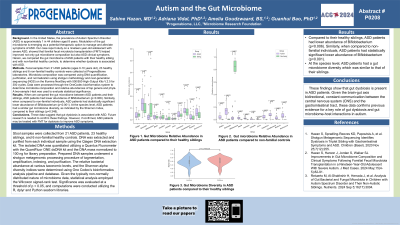Sunday Poster Session
Category: Colon
P0208 - Autism and the Gut Microbiome
Sunday, October 27, 2024
3:30 PM - 7:00 PM ET
Location: Exhibit Hall E

Has Audio
- AV
Adriana Vidal, PhD
ProgenaBiome
Ventura, CA
Presenting Author(s)
Adriana Vidal, PhD, Guanhui Bao, PhD, Brad Barrows, MD, Sabine Hazan, MD
ProgenaBiome, Ventura, CA
Introduction: In the United States, the prevalence of Autism Spectrum Disorder (ASD) is approximately 1 in 44 children aged 8 years. Modulation of the gut microbiome is emerging as a potential therapeutic option to manage and alleviate symptoms of ASD. Our case report study on a nineteen-year-old adolescent with severe ASD, showed that familial fecal microbiota transplantation (FMT) helped improved not only gut microbiome composition but also ASD clinical symptoms. Herein, we compared the gut microbiome of ASD patients with their healthy sibling and with non-familial healthy controls, to determine whether dysbiosis is associated with ASD.
Methods: Fecal samples from 21 ASD patients (ages 0-10 years old), 23 healthy siblings and 6 non-familial healthy controls were collected at ProgenaBiome laboratories. Microbiota composition was compared using DNA quantification, purification, and normalization using shotgun methodology and next-generation sequencing (NGS) on the Illumina NextSeq with 500/550 High-Output Kits V.2.5 for 300 cycles. Data were processed through the OneCodex bioinformatics system to determine microbiota composition and relative abundances of top genera and phyla. A two-sample t-test was used to evaluate statistical significance.
Results: When we compared the gut microbiome between ASD patients and their siblings, ASD patients had lower abundance of Bifidobacterium (p< 0.006). Similarly, when compared to non-familial individuals, ASD patients had statistically significant lower abundance of Bifidobacterium (p< 0.001). At the species level, ASD patients also had a much lower gut microbiome diversity, as indicated by the Shannon Index, compared to non-familial individuals (p< 0.0001).
Discussion: These data suggest that gut dysbiosis is associated with ASD. Future research is needed to confirm these findings. However, if confirmed, ASD patients may be treated with FMT for dysbiosis to improve ASD symptoms.
Disclosures:
Adriana Vidal, PhD, Guanhui Bao, PhD, Brad Barrows, MD, Sabine Hazan, MD. P0208 - Autism and the Gut Microbiome, ACG 2024 Annual Scientific Meeting Abstracts. Philadelphia, PA: American College of Gastroenterology.
ProgenaBiome, Ventura, CA
Introduction: In the United States, the prevalence of Autism Spectrum Disorder (ASD) is approximately 1 in 44 children aged 8 years. Modulation of the gut microbiome is emerging as a potential therapeutic option to manage and alleviate symptoms of ASD. Our case report study on a nineteen-year-old adolescent with severe ASD, showed that familial fecal microbiota transplantation (FMT) helped improved not only gut microbiome composition but also ASD clinical symptoms. Herein, we compared the gut microbiome of ASD patients with their healthy sibling and with non-familial healthy controls, to determine whether dysbiosis is associated with ASD.
Methods: Fecal samples from 21 ASD patients (ages 0-10 years old), 23 healthy siblings and 6 non-familial healthy controls were collected at ProgenaBiome laboratories. Microbiota composition was compared using DNA quantification, purification, and normalization using shotgun methodology and next-generation sequencing (NGS) on the Illumina NextSeq with 500/550 High-Output Kits V.2.5 for 300 cycles. Data were processed through the OneCodex bioinformatics system to determine microbiota composition and relative abundances of top genera and phyla. A two-sample t-test was used to evaluate statistical significance.
Results: When we compared the gut microbiome between ASD patients and their siblings, ASD patients had lower abundance of Bifidobacterium (p< 0.006). Similarly, when compared to non-familial individuals, ASD patients had statistically significant lower abundance of Bifidobacterium (p< 0.001). At the species level, ASD patients also had a much lower gut microbiome diversity, as indicated by the Shannon Index, compared to non-familial individuals (p< 0.0001).
Discussion: These data suggest that gut dysbiosis is associated with ASD. Future research is needed to confirm these findings. However, if confirmed, ASD patients may be treated with FMT for dysbiosis to improve ASD symptoms.
Disclosures:
Adriana Vidal: Progenabiome – Employee. Progenabiome – Employee.
Guanhui Bao: Progenabiome – Consultant. Progenabiome – Consultant.
Brad Barrows: Progenabiome – Medical Director at Progenabiome. Progenabiome – Medical Director at Progenabiome.
Sabine Hazan: Microbiome Resarch Foundation – Owner/Ownership Interest. Microbiome Research Foundation – Owner/Ownership Interest.
Adriana Vidal, PhD, Guanhui Bao, PhD, Brad Barrows, MD, Sabine Hazan, MD. P0208 - Autism and the Gut Microbiome, ACG 2024 Annual Scientific Meeting Abstracts. Philadelphia, PA: American College of Gastroenterology.
